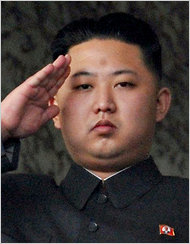|
New
& Recent Conflicts
War
and Conflict
Links Portal
for pages on the history of comics and superhero
characters Portal
for pages on the nations of the world Portal
for pages on military history Lists
of wars throughout history and from around the
world Biographical
files on individuals who impact American politics,
culture, business, education and other arenas of
life in the United States. Pages
on the governmental systems of selected
nations. United
States national government and politics. The
latest changes to the History Guy site. Information
on the History Guy, the origin of the website,
along with commentaries
and a site
map. |
"The History Guy" is a Registered Trademark.
Historyguy.com:
(1993-Present)
The Korean War (1950-1953) officially never really ended. Major fighting between North Korea and South Korea (and the South's allies, the United States and the UN), ended with an armistice signed on July 27, 1953. Over the 50-plus years, numerous border battles, clashes, incidents, espionage thrillers, assassination attempts, and terrorist acts have occurred between North and South Korea, often involving American forces as well.
Since the "end" of the Korean War in 1953, Communist North Korea has gained a reputation as a rogue state, ruled by a brutal and paranoid Stalinist dictatorship that the West cannot trust. Long known as a supplier of advanced missile and rocket technology to other rogue regimes and terrorist organizations, North Korea entered a new phase as a major concern the rest of the world in 2006. On October of that year, North Korea tested its first nuclear device, and joined the small group of nuclear-armed nations. Repeated test launches of various types of missiles also increased the tension in East Asia. On May 23, 2009, North Korea announced the test detonation of its second nuclear bomb.
See also: Korean Border Conflicts (1953-Present)

Kim Jong-Un
Nuclear Tensions
March 12, 1993--North Korea announced that it was to withdraw from the Nuclear Non-Proliferation Treaty (NPT) and that North Korea would not allow international nuclear inspectors access to North Korean nuclear sites. By 1994, it was estimated that North Korea had enough reprocessed plutonium to produce about 10 bombs.
August 31, 1998--North Korea launched a modified Taepodong-1 missile. North Korea claimed that this launch was to put a satellite into orbit. Military and Intelligence analysts believe that the satellite story was a cover, and that the North was testing an inter-continental ballistic missile (ICBM). The missile flew over Japan, prompting the Japanese government to protest and to cancel a billion dollar plan to help North Korea build two civilian light-water nuclear reactors.
February 24, 2003-- North Korea launches a missile into the sea between South Korea and Japan.
March 2, 2003--Four North Korean fighter jets intercept an American reconnaissance plane in international air space and shadow it for 22 minutes.
March 10, 2003--North Korea fires a second missile into the sea between South Korea and Japan.
May 1, 2005--North Korea fires a short-range missile into the Sea of Japan.
July 3, 2006--North Korea issues a threat that it will launch a nuclear strike against the United States in the event of an American attack.
July 4, 2006--North Korea test-fires six missiles, including a long-range Taepodong-2.
July 5, 2006 --North Korea test-fires a seventh missile.
October 3, 2006--North Korea announces plans to test a nuclear weapon.
North Korean Nuclear Test --October 9, 2006--North Korea conducted its first nuclear test.
April 5, 2009 --North Korea launches a Kwangmyongsong-2 missile launch fails to achieve orbit, falling into the Pacific after flying about 2,000 miles.
North Korean Nuclear Test --May 23, 2009--North Korea claims to have conducted its second nuclear test
May 25-27, 2009--North Korea launches six more short-range missiles into the Sea of Japan.
May 27, 2009--North Korea threatened to attack South Korea if ships from the North are searched as part a U.S.-led effort to stop vessels suspected of carrying missiles or weapons of mass destruction. North Korea also declared the truce that ended the Korean War in 1953 as invalid.
July 2, 2009 --North Korea launches four short-range missiles into the sea.
July 3, 2009 --North Korea launches three ballistic Scud or Rodong missiles into the sea.
October 12, 2009 --North Korea launches five short-range missiles into the sea.
March/April, 2013 --North Korea issues threats while the U.S. and South Korea intensify defensive preparations. Some reports indicate that China is mobilizing some military forces in Manchuria across the Yalu River from North Korea.
Korean Nuclear Tensions Resources:N Korea 'test-fires five rockets'-BBC, October 12, 2009Korean Test of Ballistic Missiles Is Reported--New York Times, July 3, 2009
North Korea Launches Short-Range Missiles-Voice of America News, July 2, 2009
North Korea Threatens to Attack South:Pyongyang Also Says Truce Ending War in 1953 Is Invalid--Washington Post, May 27, 2009
Q+A-What's the real threat of N.Korea's nuclear programme?--Reuters, May 24, 2009
2006 North Korean Nuclear Test--Wikipedia Article
www.historyguy.com/korean_nuclear_crisis.htm
Historyguy.com Search Engine
Trending on Historyguy.com Now:
Join the FREE Historyguy Update list. Receive regular updates delivered right to your inbox.
Email Marketing You Can Trust